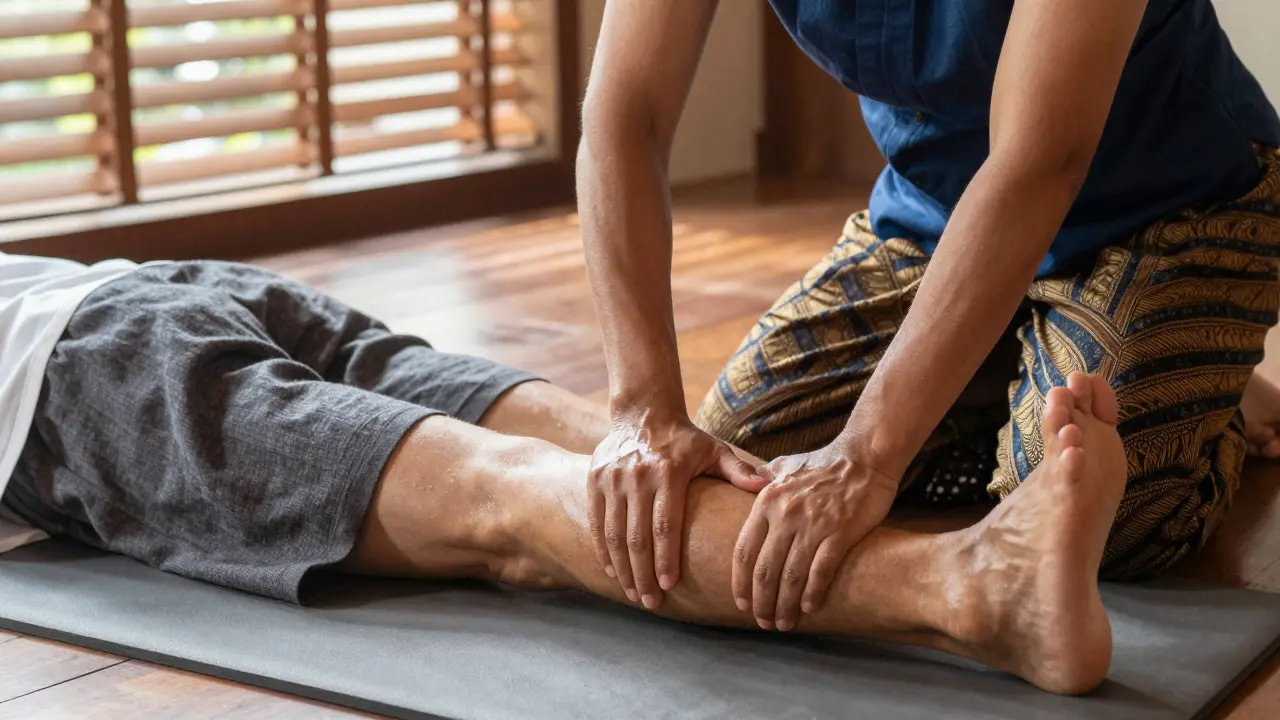Exploring Reiki Massage for Chronic Pain Relief: Benefits and Techniques

In the vast world of therapeutic practices, Reiki emerges as a distinctive form marked not only by its simplicity but also its profound impact. Originating from Japan, Reiki harnesses the idea of life force energy, which practitioners believe they can channel to support healing and balance in others.
Increasingly, individuals grappling with chronic pain are turning to Reiki, seeking not just relief from their symptoms but also a holistic path to general well-being. This curiosity about Reiki's effectiveness against chronic pain stems from its unique approach to addressing both physical and emotional aspects, signaling a shift towards more integrative healing modalities.
- What is Reiki?
- How Reiki Addresses Chronic Pain
- Personal Stories and Testimonials
- Scientific View on Reiki
What is Reiki?
Reiki, a term that sparks curiosity for many, unfolds as a healing therapy that combines spirituality with physical welfare. The essence of Reiki lies in its foundation that is deeply rooted in Japanese wellness traditions, where 'Rei' signifies 'universal' and 'Ki' means 'life energy.' This ancient form of healing is premised on the idea that every living being possesses life force energy, and disruptions in this energy flow lead to emotional and physical imbalances.
The practice of Reiki involves a practitioner placing their hands lightly over or slightly above a person's body. They aim to foster healing by facilitating the free flow of energy, thereby restoring balance and promoting health. A typical Reiki session unfolds in a tranquil setting, fostering a sanctuary-like atmosphere where individuals seek solace and rejuvenation.
Reiki practitioners often describe their method as holistic, addressing the body, mind, and spirit. This holistic tether underlines that Reiki isn’t just about alleviating physical ailments—though it is often sought for this—but also about enhancing emotional and spiritual well-being. The practice encourages self-awareness and spiritual growth, creating a profound sense of peace and fulfillment within practitioners and receivers alike.
Interestingly, Reiki's simplicity and non-invasive nature make it an accessible therapy for people of all ages and states of health. It requires no specific technological tools or pharmaceutical interventions, often described by its practitioners as a 'laying on of hands.' Despite its simplicity, the outcomes reported by those who undergo Reiki are often described as transformative.
How Reiki Addresses Chronic Pain
Imagine experiencing pain that doesn’t seem to go away. This is what life is like for many who suffer from chronic pain. Chronic pain can be debilitating, restricting daily activities and diminishing quality of life. It's here that Reiki steps in as an alternative, promising not just to manage the pain, but to energetically address its underlying causes. Reiki, a therapy based on the concept of transmitting healing energy through the hands, advocates a unique standpoint on pain alleviation. It operates on the belief that pain, especially chronic pain, often carries an emotional or energetic component, in addition to the physical aspect.
According to practitioners, Reiki helps to balance energy within the body. Those experiencing chronic pain often report feelings of being emotionally and physically drained; this is where Reiki aims to restore energy balance, fostering a sense of vitality and well-being. The practice involves light touches or even non-touch hand placements in specific sequences, focusing on energy centers known as chakras. This is believed to activate the body's natural healing processes. For many, the result isn’t just physical relief but an emotional restoration that deeply influences pain perception.
A significant observation from those who practice Reiki is the shift in pain experiences among their clients. While it is not claimed as a cure, many individuals discuss marked improvements in how they manage pain. Reiki’s gentle, non-intrusive nature makes it a favored choice for those hesitant about more aggressive medical treatments. Not only does it offer a form of pain management, but it also contributes to lowered levels of stress and anxiety, which are often common companions of chronic pain conditions.
Given its non-pharmaceutical nature, Reiki is gaining attention from the medical community as well. Some studies suggest that Reiki can significantly enhance quality of life, reducing both the intensity and frequency of pain episodes for sufferers of chronic ailments. This observation aligns with the holistic goal of Reiki—to heal the person as a whole, rather than focusing solely on the symptomatic areas.
Finally, embracing a therapy like Reiki may well stand as testament to the broader evolution within health care towards more integrative and patient-centered approaches. It represents not just an alternative, but a proactive choice for many seeking to regain control over their life’s narrative, away from the constant backdrop of pain.
Personal Stories and Testimonials
When exploring the impact of Reiki on chronic pain, the personal stories and testimonials of those who have experienced its benefits reveal much about its potential. Many individuals report a significant reduction in their pain levels, accompanied by an enhanced sense of peace and emotional relief. For instance, Sarah, a 45-year-old who has been battling fibromyalgia for over a decade, shares that Reiki helped reduce her daily discomfort and improved her sleep patterns dramatically. She describes her twice-monthly sessions as 'a dive into a calm sea', where she finds momentary escape from the relentless pain.
Another compelling testimony comes from Michael, a veteran who suffered from chronic back pain as a result of an injury during military service. After years of relying heavily on painkillers, he sought a non-pharmacological approach to manage his condition. Michael recounts his skepticism initially but notes that after several sessions of Reiki, there was a noticeable improvement in his mobility and a decrease in pain intensity.
'Reiki has opened a new door to my pain management, one that I never thought possible,'he explains.
These stories are just a snapshot of the numerous accounts where individuals grappling with diverse forms of chronic pain illustrate how Reiki has made a meaningful difference in their lives. It's not just the physical relief they cherish but also the emotional solace they gain. Many describe Reiki sessions as an opportunity to connect deeply with themselves, promoting a healing process that transcends the physical aspects of their pain.
Scientific View on Reiki
When it comes to Reiki and its acceptance in the medical community, opinions are divided. Some healthcare professionals see it as a beneficial complementary therapy, particularly in the realm of mental health and pain management. This section delves into the current scientific understanding of Reiki, examining studies and expert opinions that shed light on its effectiveness and potential as a treatment method.
While Reiki is widely regarded as a practice based more on spiritual and holistic beliefs rather than empirical science, several studies have attempted to quantify its benefits. Researchers have primarily focused on its ability to reduce anxiety, improve mood, and alleviate pain. For example, a controlled trial found significant improvements in patients with chronic pain who received Reiki sessions compared to those who received no treatment. These findings suggest that there might be more to Reiki than placebo effects, although more rigorous, large-scale studies are necessary.
Reiki's impact on the autonomic nervous system has also been a subject of interest. This system controls bodily functions such as heart rate and digestion. Studies suggest that Reiki may invoke a relaxation response, which is the body's ability to bring itself into a state of deep rest, thereby counteracting the effects of stress. This relaxation response could theoretically alleviate conditions exacerbated by stress, thereby indirectly relieving symptoms of chronic pain and improving overall well-being.
The scientific community continues to explore these potential mechanisms, but the conclusive evidence is still forthcoming. Health professionals who are open to integrative therapies sometimes recommend Reiki as part of a comprehensive treatment plan, especially in palliative care settings, where emotional and spiritual support is just as important as physical relief. However, it is crucial for patients to consult with their healthcare provider before starting any new therapy.
'Reiki should not replace conventional treatment but can be a valuable adjunct providing relief from symptoms and emotional stress.' — Dr. Sarah Brewer, Medical Director
Overall, while the complete acceptance of Reiki within scientific circles has yet to be achieved, the clinical studies and anecdotal evidence available provide hopeful signs that Reiki might play a role in the future of holistic health care, particularly in areas where traditional medicine reaches its limits.





